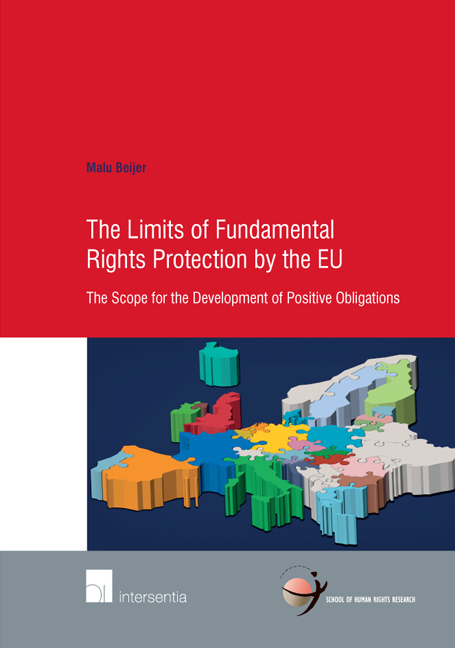 Limits of Fundamental Rights Protection by the EU
Limits of Fundamental Rights Protection by the EU Book contents
- Frontmatter
- About the Author
- Acknowledgements
- Contents
- Abbreviations
- Table of Cases
- Chapter 1 Introduction
- PART I THE CONCEPT OF POSITIVE OBLIGATIONS WITHIN THE CONTEXT OF THE EUROPEAN CONVENTION ON HUMAN RIGHTS
- PART II THE SCOPE FOR THE DEVELOPMENT OF POSITIVE OBLIGATIONS WITHIN THE CONTEXT OF EU LAW – AN ANALYSIS OF THE SPECIFIC PARAMETERS OF THE EU LEGAL ORDER AND THE EU SYSTEM OF FUNDAMENTAL RIGHTS PROTECTION
- Chapter 6 Main Principles of the EU System of Fundamental Rights Protection
- Chapter 7 The Institutional Characteristics and Judicial Culture of the ECJ
- Chapter 8 EU Competences and Subsidiarity in Fundamental Rights Protection
- Chapter 9 The Limited Scope of Application of EU Fundamental Rights
- Chapter 10 Part II – Conclusions
- PART III SYNTHESIS
- Bibliography
- Index
- Miscellaneous Endmatter
Chapter 8 - EU Competences and Subsidiarity in Fundamental Rights Protection
from PART II - THE SCOPE FOR THE DEVELOPMENT OF POSITIVE OBLIGATIONS WITHIN THE CONTEXT OF EU LAW – AN ANALYSIS OF THE SPECIFIC PARAMETERS OF THE EU LEGAL ORDER AND THE EU SYSTEM OF FUNDAMENTAL RIGHTS PROTECTION
Published online by Cambridge University Press: 27 September 2018
- Frontmatter
- About the Author
- Acknowledgements
- Contents
- Abbreviations
- Table of Cases
- Chapter 1 Introduction
- PART I THE CONCEPT OF POSITIVE OBLIGATIONS WITHIN THE CONTEXT OF THE EUROPEAN CONVENTION ON HUMAN RIGHTS
- PART II THE SCOPE FOR THE DEVELOPMENT OF POSITIVE OBLIGATIONS WITHIN THE CONTEXT OF EU LAW – AN ANALYSIS OF THE SPECIFIC PARAMETERS OF THE EU LEGAL ORDER AND THE EU SYSTEM OF FUNDAMENTAL RIGHTS PROTECTION
- Chapter 6 Main Principles of the EU System of Fundamental Rights Protection
- Chapter 7 The Institutional Characteristics and Judicial Culture of the ECJ
- Chapter 8 EU Competences and Subsidiarity in Fundamental Rights Protection
- Chapter 9 The Limited Scope of Application of EU Fundamental Rights
- Chapter 10 Part II – Conclusions
- PART III SYNTHESIS
- Bibliography
- Index
- Miscellaneous Endmatter
Summary
INTRODUCTION
The limited competences of the EU are oft en mentioned as a problematic issue in relation to its obligation to protect fundamental rights. The limits related to the competences of the EU are addressed at different places in the Charter, the explanations to the Charter, the EU Treaties as well as in the context of the accession to the Convention, and in the discussions related thereto. The EU does not have a general competence to take action to protect fundamental rights, so how can positive obligations which may require legislative, administrative or judicial measures to be fulfilled actually be accommodated within the context of EU law? Would the ECJ, first, be expanding the competences of the EU institutions if it were to impose positive obligations on them to ensure the protection of fundamental rights in the implementation of certain policy fields of EU law? Secondly, would the ECJ (always) be interfering in the competences of the member states, if it were to impose obligations on them to take additional measures to ensure that fundamental rights are protected within the scope of EU law? Thirdly, would the ECJ leave gaps in the protection of fundamental rights if it decided that there was no scope to accept positive obligations on the basis of the limited competences of the EU? To gauge the potential for the development of positive obligations by the ECJ, the issue of competences is clearly important. This chapter examines whether and within what limits the definition of negative or positive obligations can be reconciled with the principle of limited EU competences. To answer this question, this chapter will address the inherently complicated relationship between the EU ‘ s limited competences and its obligation to protect fundamental rights.
As this chapter will show, this thesis takes the principle of attributed powers of the EU as the main starting point for determining the extent to which positive obligations can be incorporated into EU law. An important reason for this is the clear emphasis which has been placed on the principle of limited competences within the context of fundamental rights protection by the EU in various legal provisions and documents.
- Type
- Chapter
- Information
- Limits of Fundamental Rights Protection by the EUThe Scope for the Development of Positive Obligations, pp. 179 - 220Publisher: IntersentiaPrint publication year: 2017
- 1
- Cited by
